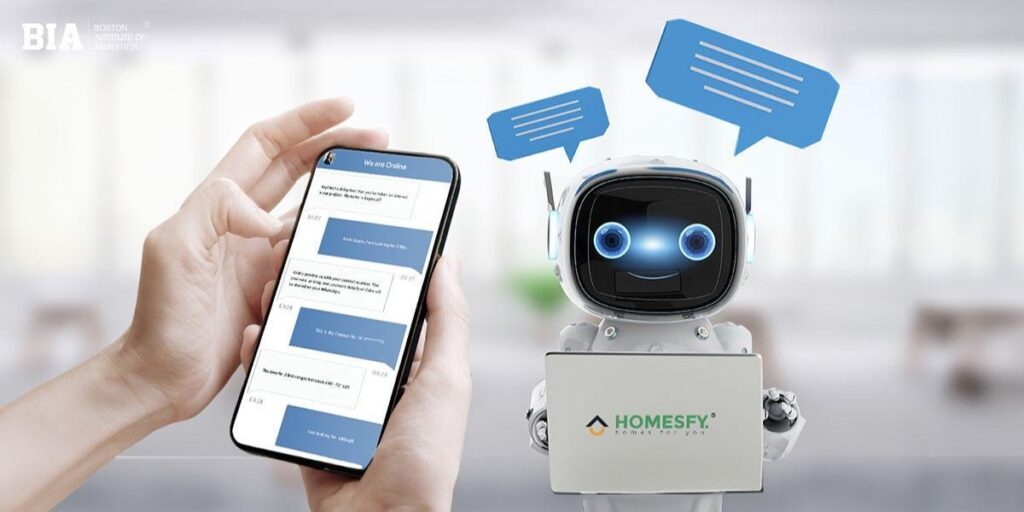
In the modern digital world, customer support has evolved from being a cost centre to a critical differentiator and a key driver of customer loyalty. Companies are constantly finding new and innovative ways to improve the customer experience, but are also trying to optimize operational efficiency. One of these new technologies is the AI chatbot technology which is disrupting the customer support landscape today. It’s no longer mount of information in the old days of plain and simple scripted responses, but sophisticated virtual assistants powered by artificial intelligence will learn from previous interactions, understand natural language, and provide immediate personalized assistance.
This article will examine the disruptive nature of chatbot in customer support discussing real-world case studies, quantifying the incredible ROI, and reviewing the strategic decision to invest in Artificial Intelligence Course for you and your team.
The Evolution of Customer Support: From Call Centres to Chatbots
The traditional call centre model has been the backbone of customer support for decades. While effective to a degree, it often suffered from long wait times, consistency of service quality, and operational costs. With the advent of email and live chat, some gains were made, but agents in live chat and email channels still faced the same challenge of receiving often repetitive questions, along with the sheer volume of inquiries.
The introduction of AI chatbots represents a major shift in this paradigm. Instead of simply following a set of rules, modern AI chatbots are able to use machine learning and natural language processing (NLP) techniques to understand context, intent and even sentiment. This advancement enables AI chatbots to manage a wider range of inquiries, provide more detailed responses, as well as interact with a larger number of business systems as they are all interconnected. The result is a better resource, both in terms of efficiency and scalability, for the customer support function, and therefore a better experience for customers.
Real Use Cases: Where AI Chatbots Shine
The submissions of AI chatbots in customer support are enormous and varied, touching not quite every industry. Here are some protuberant real-world use cases:
- 24/7 Instant Support and FAQs: This might be, to say the least, the very basic and the very finest use case. AI chatbots can render their service at all hours of the day and night and immediately answer any general inquiries or even resolve all basic issues without the need for human intervention. This can save a lot of time for customers and at the same time, make their experience better, particularly for the cases that are considered urgent and are reported after business hours. Companies like T-Mobile are using chatbots successfully to handle billing questions and give advice on troubleshooting, thus freeing up human agents to tackle more complicated issues.
- Lead Generation and Qualification: Moreover, AI chatbots can also support sales and marketing efforts. They can become very interactive with website visitors, respond to inquiries on a particular product, and even collect necessary information to qualify the leads, or, find the customer through the marketing funnel. A case in point, Drift employs its own chatbot platform to assist firms in lead generation and meeting reservations which proves the capacity of a conversational AI system to make sales a whole lot easier.
- Personalized Recommendations: Also, AI chatbots can deliver customized product recommendations relying on customer information and previous interactions. This not only shortens the customers’ search for the right items but also boosts the sales concurrently. Retail giants like ASOS have deployed chatbots that work as personal shoppers giving clothing advice based on users’ tastes and previous purchases.
- Order Tracking and Status Updates: Human agents spend a lot of their time answering questions about the status of orders, the shipping process, and the estimated time of delivery. This not only consumes their time but also entails a huge opportunity cost for the companies. AI chatbots that are integrated with the logistics and order management systems easily take over these tasks by providing customers with instant, tailored, and updated answers. As an example, “Dom the Pizza Bot” is an AI chatbot powered by Domino’s Pizza that lets customers place orders and follow the progress of their pizzas at the same time while talking on mobile messaging apps.
- Troubleshooting and Technical Support: In addition, AI chatbots can be used as first responders for technical inquiries in many companies, especially in the technology sector. The chatbots can guide the users through different troubleshooting steps, answer the questions about the technical issues that are frequently asked and then pass the more complicated cases along with the necessary context to human agents. Software companies usually embed the chatbots right into the application to provide in-app support exactly when it is needed.
- Appointment Booking and Scheduling: AI chatbots can simplify appointment, reservation, or consultation booking by checking availability, confirming details, and sending reminders, all of which relieve administrative burdens for customers and staff alike, and make the process more efficient overall. Healthcare providers are implementing chatbots to assist with appointment bookings for patients, as well as to answer standard health-related questions.

Quantifying the ROI: A Compelling Business Case
The return on investment (ROI) of applying AI chatbots in customer support is multi-layered and often significant. Here’s how businesses are seeing touchable benefits:
- Reduced Operational Costs: This may be the quickest return on investment that you will be able to implement and yield results. Automated Frequently Asked Questions (FAQs) will free up lots of questions and effort associated with human agents; therefore, you will reduce staffing costs, decrease education and training costs, and streamline associated resources. Chatbots can handle thousands of inquiries at once, while humans obviously cannot.
- Improved Customer Satisfaction and Loyalty: The customers receive their replies very quickly, 24/7, and they are provided with accurate information, which enhances overall customer satisfaction. Satisfied customers are more likely to repeat with you and promote your brand, which increases customer lifetime value.
- Increased Efficiency and Productivity: The human agents are afforded the opportunity to shift their attention from repetitive tasks, and attend to conversations that require empathy, critical thinking, and problem solving. Oh, and if your team performs well answering customer questions, the morale of the agents will increase as well.
- Scalability: Chatbots powered by AI can effectively expand to accommodate fluctuating demand while not requiring a corresponding increase in human resources. Employees cannot be expected to maintain the same levels of service throughput during peak periods or unexpected surges in inquiries which frustrate your customers.
- Data Collection and Insights: Every engagement with an AI chatbot generates useful data that can be leveraged to see where your customers have common pain points, where there are gaps in your product or service delivery, and they may reveal trends in business practices and product development. This engagement is helpful because it is a constant feedback loop you can use to improve continuously.
- Faster Resolution Times: AI chatbots’ ability to provide immediate answers to common questions drastically reduces the time it takes to satisfy inquiries and creates an overall more efficient and enjoyable customer experience.
Major research companies have consistently shown these benefits. Juniper Research, for instance, predicted that AI chatbots would save businesses worldwide over $8 billion annually by 2022. Likewise, IBM finds that chatbots address 80% of recurring questions for companies.

The Strategic Advantage: Investing in an Artificial Intelligence Course
As AI chatbots developed increasingly classy and integral to business processes, having a team that appreciates the underlying knowledge is crucial. Investing in an Artificial Intelligence Course offers more than a few strategic advantages:
- Empowering Your Team: An Artificial Intelligence Course could provide your current customer support and IT teams with the information and skills to efficiently manage, optimize and even create AI chatbot solutions. This reduces the need to rely on external consultants and promotes internal innovation.
- Better Implementation and Integration: Having a better understanding of AI principles leads to more effective planning, development and integration of chatbot solutions with existing CRM systems, knowledge bases and other business tools.
- Optimizing Chatbot Performance: By understanding how machine learning models function, teams are then in a better position to train chatbots, identify areas of improvement as well as optimize their levels of accuracy, effectiveness and efficiency.
- Staying Ahead of the Curve: AI is evolving rapidly as a sector and an Artificial Intelligence Course will enable your team to remain up-to-date with the latest developments, ensuring your business can take advantage of the most current chatbot technologies as they arise.
- Driving Innovation: An informed team you are then better positioned to identify new opportunities to use chatbots across various business functions. Creating a culture of innovation and potential competitive advantage.
Final Thoughts
The use of AI chatbots in customer support isn’t simply a passing fad; it is truly a shift of paradigm in customer-business interactions. In addition to providing 24/7 instant support and recommendations personalized for each customer, they also have clear measurable benefits that include reduced expenses and enhanced customer experience. These benefits, combined with strong ROI, scalability, and the opportunity to collect useful information, provide a compelling business case for using an AI chatbot.
For businesses wanting to achieve the full capacity to change customer support with this amazing technology, it will be essential to train their employees with an Artificial Intelligence Course. This will empower employees, gain the full advantage of implementation and help maintain leading status in designing customer experiences in a world that grows more AI- based. Customer support must have an intelligent, conversational, and AI based future.
